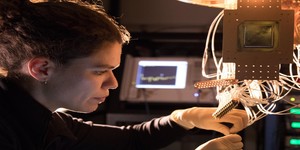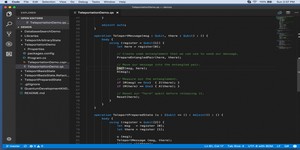University of Bristol opens up its quantum processor
September 6, 2013 | 11:11
Companies: #university-of-bristol

The University of Bristol's School of Physics is to become the first establishment in the world to provide public access to a quantum computing system, in an effort to make the concept easier for people to grasp.
Traditional computing, as readers of this site will be very aware, works on a binary principle: the smallest unit of computer logic is the 'bit,' which can be either zero or one. The language may differ depending on what you're doing - false and true, off and on - but the bit remains the same. Some progress has been made in so-called trinary systems, which replace the bit with a three-state trit - jokingly claimed to have as its states yes, no and maybe - and there are historical dernary systems which counted in base-10 like humans, but binary is the predominant paradigm.
Quantum computing is a lot like binary, in that each bit of a quantum processor has a zero state and a one state. Unlike a traditional processor, however, a quantum processor holds each bit in 'superposition' - meaning it is both zero and one simultaneously.
It's a concept that's hard to grasp, and which for many draws parallels with Erwin Schrödinger's famous thought experiment of the cat in the box with the nuclear decay-based poison trap: when the half-life of the decaying element has passed, the cat can be said to be both alive and dead - held in superposition - until such a time as the box is opened and an observer collapses the superposition into one of the two possibilities.
Superposition is the secret behind the potentially vast power of quantum processors: if you want to look for two outcomes in an equation, a traditional processor will have to perform the calculation twice; a quantum processor, by contrast, can give you both answers at the same time.
To exploit the possibilities offered by quantum computing requires education, which poses a problem: current quantum computers are extremely expensive, and require equipment - such as liquid nitrogen cooling jackets - out of the reach of home users. To help address this issue, the University of Bristol has announced plans to provide public access to its in-house two-bit quantum processor.
Building on the University's publicly-accessible quantum processor simulator, the team is to provide access to to the quantum processor under the Qcloud project so that researchers can experiment with quantum superposition as well as quantum entanglement - the ability to create interference between two photons which links them even when they are physically apart, famously described by Albert Einstein as 'spooky action at a distance.'
Interested parties can use the Qcloud simulator now and pre-register for access to the processor itself ahead of the go-live date of the 20th of September on the official website.
Traditional computing, as readers of this site will be very aware, works on a binary principle: the smallest unit of computer logic is the 'bit,' which can be either zero or one. The language may differ depending on what you're doing - false and true, off and on - but the bit remains the same. Some progress has been made in so-called trinary systems, which replace the bit with a three-state trit - jokingly claimed to have as its states yes, no and maybe - and there are historical dernary systems which counted in base-10 like humans, but binary is the predominant paradigm.
Quantum computing is a lot like binary, in that each bit of a quantum processor has a zero state and a one state. Unlike a traditional processor, however, a quantum processor holds each bit in 'superposition' - meaning it is both zero and one simultaneously.
It's a concept that's hard to grasp, and which for many draws parallels with Erwin Schrödinger's famous thought experiment of the cat in the box with the nuclear decay-based poison trap: when the half-life of the decaying element has passed, the cat can be said to be both alive and dead - held in superposition - until such a time as the box is opened and an observer collapses the superposition into one of the two possibilities.
Superposition is the secret behind the potentially vast power of quantum processors: if you want to look for two outcomes in an equation, a traditional processor will have to perform the calculation twice; a quantum processor, by contrast, can give you both answers at the same time.
To exploit the possibilities offered by quantum computing requires education, which poses a problem: current quantum computers are extremely expensive, and require equipment - such as liquid nitrogen cooling jackets - out of the reach of home users. To help address this issue, the University of Bristol has announced plans to provide public access to its in-house two-bit quantum processor.
Building on the University's publicly-accessible quantum processor simulator, the team is to provide access to to the quantum processor under the Qcloud project so that researchers can experiment with quantum superposition as well as quantum entanglement - the ability to create interference between two photons which links them even when they are physically apart, famously described by Albert Einstein as 'spooky action at a distance.'
Interested parties can use the Qcloud simulator now and pre-register for access to the processor itself ahead of the go-live date of the 20th of September on the official website.

MSI MPG Velox 100R Chassis Review
October 14 2021 | 15:04








Want to comment? Please log in.